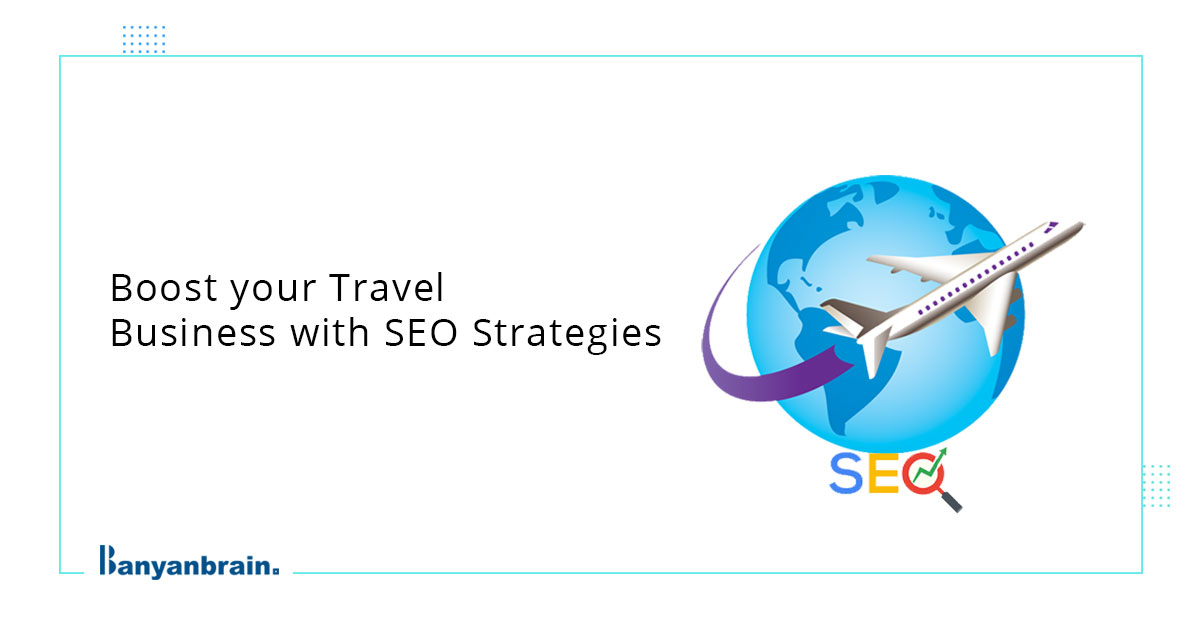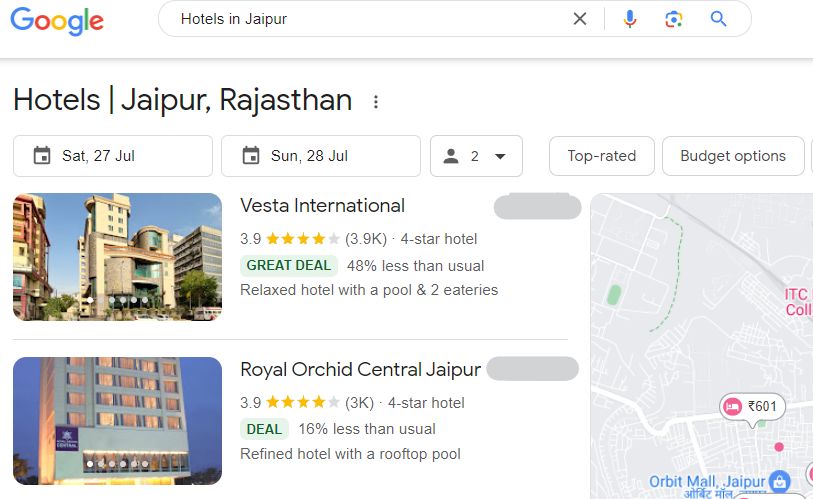SEO offers long-lasting benefits for the travel industry that will help it survive in the competitive world of digital marketing. When people want information about a destination, book a hotel, or discover new places, they turn to Google. SEO for travel industry allows your travel agency, hotel, restaurant, or farmhouse to bring traffic to your online platforms, ensuring a secure future for your business.
According to IBEF (India Brand Equity Foundation), India’s travel and tourism industry generated US$199. 6 billion in revenue alone in 2022, contributing 7.6% of global GDP. There is a lot of scope for digital marketing in the travel industry; therefore, this data proves that digitally enhancing your company’s relationship with the travel industry would be very beneficial. This comprehensive guide to SEO for travel industry will help you decide your effective SEO strategy.
Benefits of SEO for Travel websites
SEO does not offer results right away, it takes time to show its real effect. Let’s understand some key benefits of SEO for travel industry:
- Increased visibility: As the name suggests, SEO enhances the visibility on SERPs ( Search Engine Result Pages). This will help you to claim your existence in the market.
- Higher traffic: Incorporating SEO for tourism in your content will let potential customers attract to your site. One not even searching for your site can land on your website due to the relevant keyword.
- Improves user experience: A strong online presence, backed by SEO, attracts potential customers and enhances their experience. SEO makes it easier for users to book hotels and tickets and search for restaurants and travel destinations, providing valuable service to your customers.
Now we will explore some SEO strategies for the travel industry that will optimize the website and satisfy the consumer.
Keyword Research and Strategy in SEO for the travel industry
It is very important to recognize the reliable keywords that your customers are searching for. Understand what the customers need, a vacation, an adventure, a budget-friendly or luxurious holiday, and decide your keywords accordingly.
Keyword research in SEO for travel industry can be done by:
- You can use tools like semrush, ahrefs, chatGPT, and KW Finder to search for relevant keywords.
- Identify the high-value keywords most suitable for your websites to drive the attention of potential customers.
- There are two types of keywords: short tail and long tail. Long tail keywords are more valuable than short tail keywords as they have a lower search volume than short tail, and they can attract more attention to your website. Or inculcate as many long-tail keywords as you can.
- Optimize your titles and meta descriptions by including focus keywords in them.
Understanding search intent
Companies providing travel services must understand what and why their customers are searching for. These basic SEO tips and tricks will help them understand customer behavior and increase traffic.
User’s search intent can be of following four types:
- Informational: Customers need information about a location, price, activity, or trip, such as the best locations in Manali.
- Navigational: customers searching for a particular web page or website. E.g., make my trip login.
- Transactional: Paying customers who want to book the services. E.g., book a hotel in Jaipur.
- Commercial: Potential customers who compare prices, destinations, or services. Such as the best restaurants in Delhi.
Local SEO for travel business
Local SEO is very important in the travel industry to reach their dream audience in specific locations. More than 50 percent of people first visit the website to learn about local stores, hotels, or restaurants.
Local SEO for travel industry businesses can be done by:
- Recognize the local keywords and use them efficiently in your website or content.
- Try to include landing pages that are specific to some locations. Incorporate webpages related to every location, site, or service you offer.
- Execute strategies such as management of reviews, schema markup for SEO, and optimizing your site for mobile.
- You can also create a google business profile that is free of costs to make more people aware about your website.
- Optimise your google business profile by adding reviews, blog posts, articles about location, provide maps of locations, creating videos while traveling and posting them on social media, adding pictures of local people.
How to do on-page SEO for travel industry?
On-page SEO is important for every industry, but in the travel industry, it is crucial to decorate your homepage to attract more and more potential customers.
Here are some ways to enhance your on-page SEO for travel industry:
Creating high-quality, engaging, and informative content:
Creating high-quality content is essential as content rules over search engines. You can do this by:
- Your content must be informational, relevant, and user-friendly.
- Post relevant keywords regularly in your optimized content, such as blog posts, articles, hotel reviews, and location blogs.
- Use responsive design to make your site mobile-optimized.
- Keep up with the trends or changes and update your content accordingly.
- Include visual content in your content to make it interesting to read.
Use keywords in content (titles, headings, meta descriptions):
Titles, headings, and meta descriptions are important parts of the content. They decide whether the user will click on your website, so optimizing your title tags, headings, and meta descriptions with relevant keywords is important. You can hire a company providing the best travel SEO services to optimize your content with suitable keywords.
- Adding focus keywords in meta tags and titles provides relevance to your content. This increases the chances that the user will click on your link and see the keyword the user has searched for.
- Also, using keywords in the content will optimize the content and increase your visibility for search engines.
- Headings must be catchy and optimized, providing a hierarchical structure to the content that is easy to understand.
Importance of site speed and mobile-friendliness:
Mobile optimization ensures your site works properly on small screens. Site speed matters to enhance the user experience. The best digital marketing company can provide you with the best design for your site.
- Half of website traffic is generated from mobile phones. So, use responsive designs to create a website that adjusts its size according to the design.
- Use lazy loading for your website to increase the site speed.
URL structure, image optimization, and internal linking:
Optimizing URL structures and images and including relevant links to your website will help enhance your site for users and search engines. Travel SEO experts can help you optimize your images, URL, and links by:
- Include the focus keyword in your URL for visibility purposes. Don’t use numbers in your URL. Never change your link once you have been indexed.
- For image optimization, use images relevant to your content, like location pictures and mages of your luxurious restaurants and hotels. Optimize these images by reducing their size with JPED, WebP, TinyPG, and many more. Use descriptive file names and alt text for your images.
- Include reliable links to your webpage to engage the user and ensure user-optimized anchor text with a relevant focus keyword.
Implementing schema markup for travel-related content:
SEO for travel industry includes Schema markup or structured data that allows users to understand the body of your content better, therefore improving traffic and providing rich leads to your website.
- Structurize your website’s services, and locations using schemas markup.
- Adding schema markup to your site for audience reviews, contact information, address, working hours, and reviews and rating schema will help enhance search engine rankings.
Benefits of rich snippets in search results:
Travel SEO includes optimizing rich snippets for better search rankings on google. These rich snippets increases the visibility of your website by ranking it on the top of SERP.
- Rich snippets will increase your click-through-rates (CTRs) by making your listing more eye-catching, informative, and encouraging.
- Showing reviews, ratings, and service prices will show your credibility.
Off-page SEO for Travel Industry
Off-page SEO for the travel industry optimizes your digital presence outside your website to enhance your rankings in SERPs. Off-page SEO services primarily involve adding backlinks to your site which increases the visibility of website when the backlinks are from reputable sources.
Also, writing guest blogs, participating in forums and discussions, answering customers’ questions on Quora, and commenting on other blogs will help you gain backlinks from other reputable websites.
Conslusion
SEO is very important to stand out from this crowded travel industry. Using SEO for travel industry, you can increase traffic, claim higher rankings in search engines, generate more targeted leads, convert potential customers into paying customers, and establish your online presence.
Local page, on-page, and off-page SEO and keyword research improve your site’s visibility. Rich snippets, schema markups, titles, and meta descriptions decide whether your website will be clicked. So optimise them with relevant keywords and precise content. Adding Backlinks will help you collaborate with reputable sites, increasing your site’s appearance and reputation. Travel companies are a grown-up industry, and adding SEO will help you bring in more customers and secure future profits.
FAQs
1. What is SEO in tourism?
SEO in tourism optimizes the online presence to increase visibility, customers, and engagement. Some tactics are high-quality content, on-page, off-page, and local SEO.
2. How do I find keywords for my travel blog?
You can find keywords for your content through various sources, such as Ahrefs, SEMRush, Keyword Planner, chatGPT, and Google Search Console.
3. What are the latest SEO trends in the travel sector?
Making short blogs and reels on Instagram, YouTube, and other social media channels is an SEO trend nowadays. In addition, people combine their business with leisure activities, extending their trips to short vacations, also called bleisure travels.
4. What is the key content of a travel blog?
The blog’s key contents are local SEO, destination guides, service reviews, travel tips, local culture, and pictures of people traveling.
5. How can travel companies leverage content marketing for SEO?
Writing blogs and articles can enhance your visibility. Therefore, content marketing for tourism enhancing SEO can include local keywords and use tools like local listings and social media.








